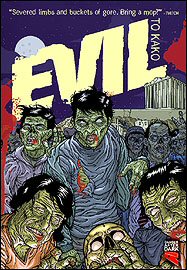
Perhaps no other horror icon has evoked such terror and fascination in 20th century cinema as the Zombie, a symbol of not only despair and violence but hopelessness and the terrifying mob mentality of our species. Feeding on our primal fear of death, the zombie also exploits our social apprehensions. While the undead traditionally symbolized meaningless labor and the inequality between the races/classes, seen in the labor-producing misfits of White Zombie and I Walk With A Zombie, and were rooted in the very real folk belief that certain men could reanimate corpses/control the minds of ill people with the use of exotic drugs and ceremonies, the arrival of George A. Romero's Night of the Living Dead (1978), lent additional political subtext to the genre. Followed by Dawn and several imitations (and expansions) of the theme, modern hungry dead folk weren't interested in picking cotton -- they wanted to eat the family dog! Attacking conservative middle class morality and the status quo so often embraced even in horror films (which despite appearances are often conservative), the new breed of zombies weren't only more violent, and their attacks more graphic, they also broke, bit, and tore their way through taboos of cultural and cinematic taste. The same zombies stalking across the silver screen were metaphors for the hungry status quo. This time- honored thematic relevance is expressed with great emotional effect in Evil, a hard-boiled return to the gritty violence and psychological unease of classic grind house cinema. A low budget attack of sensationalistic action and gritty amorality, this brazenly vicious story is honest in its intentions to shock. Respecting the social awareness established in previous zombie films, director Yorgos Nousias Evil is a genre film whose horrors are imbedded in both reality and the subjective POV of the viewer, keeping the origins of its undead outbreak enigmatic and the fate of its sympathetic characters unclear. While touching on such thematically serious issues as gender conflict and culture, this impressive z-budget film looks far more impressive than it should, with a plot and sense of pacing that puts this year's multi million dollar duds to shame!
In a plot that combines the graphic viscera of Fulci and the drama of Romero, Evil translates (and makes fresh) several genre tropes, re-assessing otherwise familiar story patterns through the unique interpretive lens of its director's imagination. Soaking the streets of a far removed Athens with blood and social reflection, this modern parable is as weighty with emotion as grue. Tragedy is as crucial to the ambitious if ambiguous narrative as stylish dismemberments, witty dialogue, and both settings and an atmosphere that lend a basic believability to the terrifying action. This is hailed as the 'first Greek zombie' film. I might also add that it is one of the most gripping low budget pictures of the year, achieving much with little. In a rapid fire plot that follows the misadventures of typical survivors trying to survive not only zombies but each other, Evil focuses on the deadly plague that three workers in Athens spread after being attacked by a mystical, ambiguous force beneath the streets of Athens. Infection spreads rapidly through the city, transforming citizens into zombies. While this may appear cliché at first glance, following in the tradition of just about every other zombie/infection film, the enigmatic nature/source of the disease, and the ensuing carnage, is both energetic and unique in its bleak depiction of apocalypse. The story focuses on a group of misfits, including an insane solider, the daughter of one of the earlier zombies, an amorous cab driver, etc., each of which must battle their own hopelessness and base urges before they can battle the external nightmares of the living dead. The bulk of the story revolves around this small group's attempts to stay alive. Instead of diminishing our emotional involvement, the script's decision to focus on the claustrophobia of the group's horrid situation. Character and mood are evoked amidst copious gore and wild, humor. Sheer exhilaration compensates for any technical deficiencies, of which there are surprisingly few. Ending on a nihilistic note as beautifully shocking as it is morose, this narrative is clearly devoted to evoking panic with inspired direction and creative editing.
Never apologetic in his insistence to provide solidly crafted thrills with a troubling subtext of personal culpability, director Yorgos Nousias makes equally sure to depicts humanity as meat. Meat to be eaten, to feed, to preserve, to mangle, to breed with. Meat that thinks and feels and fights to protect itself. This primal sense of our basic unimportance is mirrored by character's never-ceasing struggle for survival and an impressive disdain for fair play. We are offered no safety nets of logic or sense. Faith is as useless as good table manners. Still, some fight to retain not only their life but their emotional integrity, and the battle between not only characters with one another but with their own constantly evolving attitudes makes this thriller that much more fascinating. While its easy to throw names around, comparing the film to Peter Jackson's Brain Dead or Bad Taste (as well as elements of 28 Days Later), it must be noted that Nousias wields a style all his own. The film establishes its own sense of identity and aesthetic approach to material that in lesser hands would have felt cliché. Effects are impressively believable for the most part, doubly impressive when considering the low budget the crew had to work with. With photography by Petros Nousias and Claudio Bolivar that captures the emotional intensity and gritty violence of the explosive action, and a story that combines brains and brawn, Evil is a triumph of mood and action, delivering both the physical carnage expected by devotees and emotional intensity.
Review by William P. Simmons
| Released by |
| Region 1 - NTSC |
| Not Rated |
| Extras : |
| see main review |